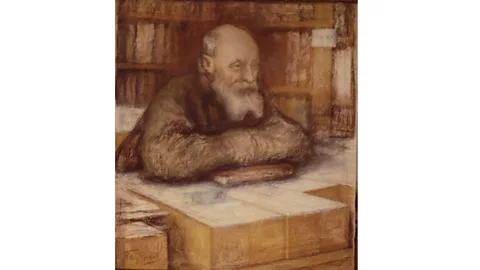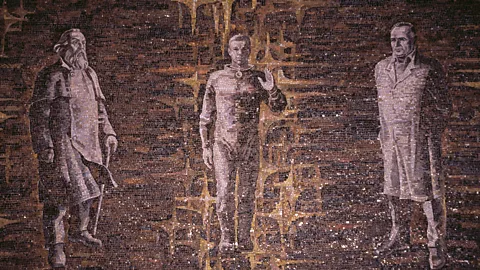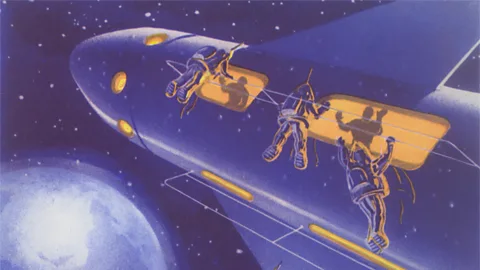Cosmism: Russia's religion for the rocket age
 Amir Zakirov/TASS/Getty Images
Amir Zakirov/TASS/Getty ImagesNikolai Fyodorov's beliefs in a cosmic religion centred on life off Earth helped inspire some of the Soviet Union's most brilliant engineers.
On 28 December 1903, during a particularly harsh Russian winter, a pauper died of pneumonia on a trunk he had rented in a room full of destitute strangers. Nikolai Fyodorov died in obscurity, and he remains almost unknown in the West, yet in life he was celebrated by Leo Tolstoy and Fyodor Dostoevsky, and by a devoted group of disciples – one of whom is credited with winning the Space Race for the Soviet Union.
Now, just as he prophesied, Fyodorov is living a strange afterlife. He has become an icon for transhumanists worldwide and a spiritual guide for interplanetary exploration.
Fyodorov's poverty came by religious choice rather than material necessity. He was the illegitimate child of Prince Pavel Gagarin, and spent his early childhood on the family's country estate, until the sudden death of both his father and grandfather, Prince Ivan Gagarin. While Fyodorov's family had no connection to the first cosmonaut, Anastasia Gacheva of the Fyodorov Museum-Library in Moscow says there is "an important symbolic coincidence – between the Gagarin who foresaw spaceflight in a philosophical way, and Yuri Gagarin who became the world's first cosmonaut".
Fyodorov lived an ascetic lifestyle – sustained only by bread, tea and water – but he inhabited an exhilarating intellectual milieu. As librarian of the Rumyantsev Museum opposite the Kremlin, he hosted an informal intellectual salon, and his devotees referred to him as "the Socrates of Moscow". Dostoevsky was in awe of "this great thinker… his ideas have enthralled me: when I read them and understand what they mean, I feel as if they are completely part of me, that they are close to my heart, that they could be mine". The novelist spent hours discussing Fyodorov's theories with the philosopher Vladimir Solovyov, who regarded Fyodorov as a Christ-like figure, while Tolstoy described Fyodorov's worldview in a letter to a friend:
He has devised a plan for a common task for humanity, the aim of which is the bodily resurrection of all humans. First, it is not as crazy as it sounds (don't worry, I do not and never have shared his views, but I have understood them enough to feel capable of defending them against any other beliefs of a similar material nature). Secondly, and most importantly, because of these beliefs he leads the purest Christian life... He is sixty, a pauper, gives away all he has, is always cheerful and meek.
Tolstoy and Fyodorov shared a similar creed, driven by a fierce resistance to war. Fyodorov lamented that, while the poor remained at the mercy of droughts and floods, universities had become nothing more than "the backyards of factories and army barracks, that is, serving industrialism and militarism". Both men wished to divert war's destructive energies into ecological renewal ("A civilization that exploits, but does not restore, cannot have any other result than the approach of its own end," wrote Fyodorov). Like Tolstoy, he opposed the idea of books as private property. When his few written works were compiled for publication posthumously, they were accompanied with sticker stating: "Not for Sale".
 Leonid Pasternak
Leonid PasternakFyodorov's philosophy stemmed from the defining moment of his life – the deaths of his father and his father's father – and his family's subsequent departure from their rural idyll. All his intellectual endeavours can be understood as an attempt to repair that rupture, to restore and recapture a lost Eden. His Philosophy of the Common Task envisages a world in which each generation will resurrect its dead ancestors (we should give birth to fathers, he wrote, rather than children). But this will soon overpopulate the world, so it is imperative that we reach into space to settle on new stars, where the resurrected can live harmoniously. Yet the further we venture, the more we will need to revive ("All matter is the dust of ancestors") – so the only solution is radical life extension: the death of death itself.
You might also like:
Despite his focus on lost ancestors, Fyodorov's legacy was to inspire new generations. His most brilliant protégé, Konstantin Tsiolkovsky, was also defined by a traumatic childhood event. At the age of 10, Tsiolkovsky caught scarlet fever and became almost completely deaf: schools barred him from entry, so for three years he studied at the Rumyantsev under Fyodorov's guidance. There he became fascinated with the colonisation of space, which he came to believe would liberate humankind and lead to the perfection of the species.
A recluse by nature, Tsiolkovsky spent most of his life in a remote log cabin, where he devoted himself to "each atom's eternal well-being". His most important work, Exploration of Outer Space by Means of Rocket Devices (1903), pioneered astronautic theory, proving for the first time that space flight could be propelled by boosters. He sketched designs for rockets with steering thrusters, for space stations and airlocks for exiting into a vacuum, and for closed-cycle biological systems to provide food and oxygen for space colonies – all of which would later inspire Soviet engineers. "Mankind will not remain forever on Earth," he predicted. "The pursuit of light and space will lead him to penetrate the bounds of the atmosphere, at first timidly, then conquering the whole of solar system."
Fyodorov's acolytes, including Tsiolkovsky and Solovyov, are associated with an intellectual movement called "Cosmism", which made a significant impact in philosophy, theology, the sciences, and the visual arts, in both pre-revolutionary Russia and the Soviet period. Although averse to Fyodorov's Orthodox Christianity, senior Soviets admired his critique of consumerism – the "toys" that divert our attention and imagination – and his emphasis on collective salvation ("not for oneself and not for others, but with everyone and for everyone", wrote Fyodorov).
 IPS/Getty Images
IPS/Getty ImagesOne hundred years ago, at the height of the Russian Civil War, one group took Fyodorov's ambitions to stratospheric levels. The Biocosmist-Immortalists, announcing their split from the Anarchist-Universalists, denounced death as "logically absurd, ethically impermissible, and aesthetically ugly". They advocated the galactic liberation from statehood, called for the urgent establishment of cosmic communication, and made two "basic" demands: freedom of movement in interplanetary space; and the right to live forever.
The author of the 1921 Biocosmist manifesto, Alexander Svyatogor, followed Fyodorov in defining two types of death: bodily decomposition, and spiritual death – what he called "death-in-life". Fyodorov identified this with the loss of one's distinctive personality and identity, while Svyatogor applied it to capitalism, arguing that death lies in "monstrous private ownership", which cannot be eliminated in a mortal world, where dying buys you a private piece of time. Svyatogor also adopted Fyodorov's idea of transforming the planet into a giant "Earth Ship", so that instead of continuing as idle passengers around the sun's orbit, we become "the crew of our celestial craft". For Cosmists, the point is not to understand nature, but to change it.
In 1922, the founder of the Petrograd chapter of the Biocosmists, Alexander Yaroslavsky, wrote a 14-page poem in praise of "anabiosis" – the process of cryonic suspension used two years later to preserve Lenin's body. (When refrigeration proved unsuccessful, his corpse was embalmed). During the early years of the Soviet Union, Lenin had tolerated the Cosmists, but they were soon circumscribed by his successor. Stalin was hostile to the religious roots of their scientific outlook, and many had been publicly supportive of his rival Trotsky. The vast majority of Cosmists were jailed or sent to labour camps (like Svyatogor, who disappeared in Siberia), and all their works were suppressed.
Following Stalin's death, the Soviets turned again to space, just in time to counter American efforts to launch satellites into orbit. Sergei Korolev, the chief designer of Sputnik 1 and Gagarin's rocket Vostok 1, had been profoundly influenced by Tsiolkovsky. After their meeting, a youthful Korolev wrote: "I left his house with just one thought: to build rockets and fly in them. From now on, I have one goal in life – to get to the stars."
Korolev oversaw the design and construction of Sputnik 1 in just one month: it was launched on 4 October 1957 – the same year in which he published The Practical Significance of Konstantin Tsiolkovsky's Proposals in the Field of Rocketry.
 Found Image Holdings/Getty Images
Found Image Holdings/Getty ImagesWith the fall of the Soviet Union, it became possible for Cosmists to re-establish the link between religion and science. Harvard University professor Anya Bernstein, author of The Future of Immortality: Remaking Life and Death in Contemporary Russia, says that 21st Century Cosmists "worship" Gagarin for his role in realising Fyodorov's "prophetic" vision. By leaving this mortal coil, we fulfil God's mission, wrote Fyodorov, and "the divine word becomes our divine action". In time, we become the cosmic mind of the universe itself – a concept called the "noosphere", developed by Tsiolkovsky's contemporary Vladimir Vernadsky.
Today, Russia is second only to the United States in its uptake of cryogenic procedures, says Bernstein. Yet the Russian Immortalist movement draws a sharp distinction with American Transhumanism, whose emphasis is secular and generally more libertarian. (Some of its most extreme proponents, far from imagining an end to capitalism, dream of extending infinitely the productivity of their workers). In Russia, by contrast, cryonicists began by preserving their parents and grandparents, reflecting Fyodorov's emphasis on kinship. Some Fyodorovians even object to this process entirely, on the basis that it is selective: Fyodorov's vision was one of universal salvation ("a union of immortal beings"), not a division between the rich elect and the poor damned.
Nonetheless, a portrait of Fyodorov sits alongside one of Arthur C Clarke in the Church of Perpetual Life, in Hollywood, Florida. Now numerous American futurist thinkers acknowledge their debt to Fyodorov.
This brave new world seeks to meld space and cyber-space. For both Immortalists and Transhumanists, the human personality lies in the brain, which can live eternally if "uploaded" onto a computer, a favoured theme of science fiction writers. The company Neuralink aims to provide brain-machine interfaces which merge human consciousness and artificial intelligence – helping humans "stay relevant" in a world dominated by AI.
These Cosmist schemes are replete with ethical anxieties, and it seems fitting that Fyodorov was fascinated by the figure of Faust. Cosmism even has its heretics, such as Alexander Bogdanov, who once wrote a short story about a thousand-year-old man who kills himself to escape the tedium of eternal life. A surfeit of being robs us of the essence of being – and death, contrary to Fyodorov's claim, actually brings meaning to our lives, by giving us a limited window in which to act and to love.
Fyodorov would argue that this critique merely reflects a failure of our imagination, a "manifestation of our infantilism". We need to outgrow our fears, and grow into our destinies. As his own student Tsiolkovsky wrote: "Earth is the cradle of humanity, but one cannot remain in the cradle forever."
--
If you liked this story, sign up for the weekly bbc.com features newsletter, called “The Essential List”. A handpicked selection of stories from BBC Future, Culture, Worklife, and Travel, delivered to your inbox every Friday.
